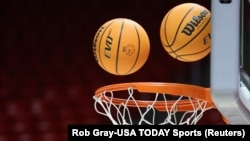The second edition of the Basketball Africa League kicks off March 5 in Dakar, Senegal.
Two other cities, Cairo, in Egypt and Kigali, in Rwanda, will host this edition’s matches. As was the case for the historic inaugural tournament that took place in May 2021 in Kigali, Rwanda, 12 teams will try to succeed Zamalek of Egypt, winner of the first BAL. Initiated by the prestigious NBA, the North American basketball league, in partnership with the International Basketball Federation, the BAL replaces the former African Basketball League. How did we get here?
When Egypt’s Zamalek lifted the very first Basketball Africa League trophy, at the Kigali Arena, on May 30, 2021, the African continent took another step in professionalizing its basketball. Like the Egyptian winner, created in 1911, most of the continent's popular clubs have existed for a very long time, but it was only in the 1970s that an interclub basketball competition was really born, the African Cup of Champion Clubs. The 1980s saw an explosion of African talents in the NBA.
Sonny Young, Journalist VOA, says, “It's no surprise the Basketball Africa League has named two of its biggest awards after pioneering big men on the continent, the BAL’s most valuable player award, named after a Hakeem “the dream” olajuwon from Nigeria. And the BAL’s defensive player of the Year award named in honor of Dikembe Mutombo, the Congolese giant. Probably the two best big men ever from Africa. They've inspired a lot of young African players, I see a lot of Olajuwon I when I look at Joel Embiid on the court, some of the moves he makes for a big man, very special player.”
The NBA started showing a growing interest in the continent, holding the very first "Basketball without Borders", in Johannesburg, South Africa, in 2003. Senegal hosted the 17th edition in 2019. Initiated by the NBA in conjunction with FIBA, this program focuses on improving basketball skills for young African talents. NBA players coach these youngsters.
Edward Rwema, Journalist VOA, says, “So far young talented African basketballers have been scouted from these camps. They include Joel Embiid who now plays for Philadelphia 76ers, a team that is doing very well in the NBA league. Another player who also attended this camp is Pascal Siakam from Cameroon who plays for Toronto Raptors and most recently helped his team to win their first NBA championship. This is a good platform for those young Africa players to shine and hopefully propel them to play in major leagues like the NBA.”
Today, a dozen of African play in the NBA and are asserting themselves in the most remarkable way, says Joad Jose Santarita, journalist in the Portuguese Service of VOA.
Santarita says, “When counting the players from Africa, we come across something rather difficult, because there are many players with African names, that are registered as players from another country. Why? Because they were born in another country, say in France, say in Greece, but whose parents were Africans. And incidentally, those that were born in Africa, played in Africa, and then came to the NBA. Joel Embiid who plays for the Philadelphia Seventy Sixers, Neemias Queta. Now. He is registered as a Portuguese player, but his parents are from Guinea-Bissau, so let's call him an African player.”
The NBA no longer doubts Africa’s wealth of talents, who just need nurturing to blossom. Hence the birth of Basketball Africa League in February 2020. The first edition took place in 2021 in just one city, Kigali, Rwanda, because of Covid-19 pandemic.
Victor Williams, Chief executive, NBA Africa, says, “The NBA is making an investment in growing the game across the continent, broadly speaking, and investing in supporting coaches and game officials. We’ll continue to spend money on the game.”
According to its promoters, NBA Africa involves individual investors including former president Barak Obama, former NBA star Dikembe Mutombo, originally from the Democratic Republic of the Congo.
For this second edition of the BAL, 12 committed teams will compete in three cities, Dakar, Cairo and Kigali, to succeed Zamalek. The opening match will pit DUC of Senegal against Seydou Legacy Athletic Club of Guinea on March 5 in Dakar. This year, the teams have been divided into two conferences of six: The Nile conference and the Sahara conference.




